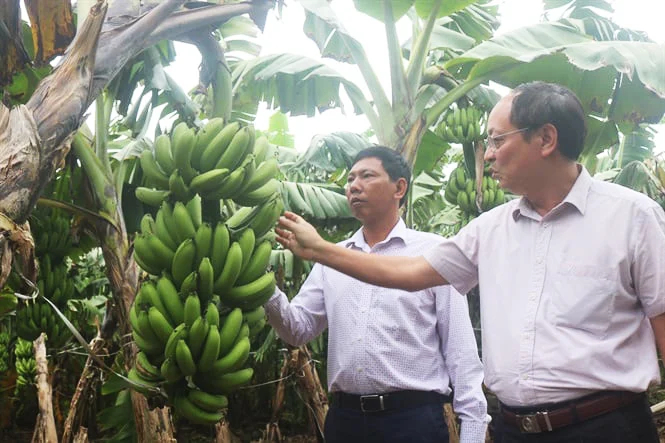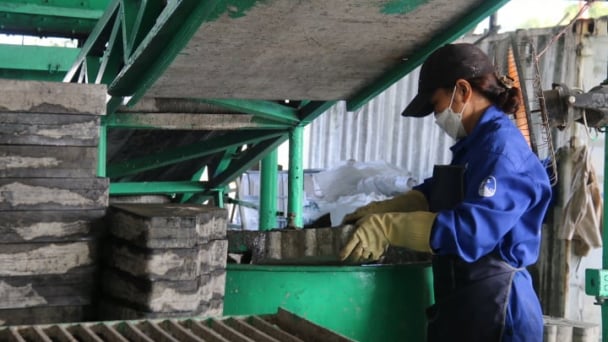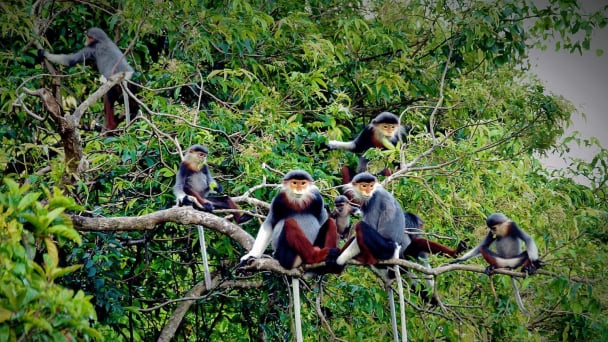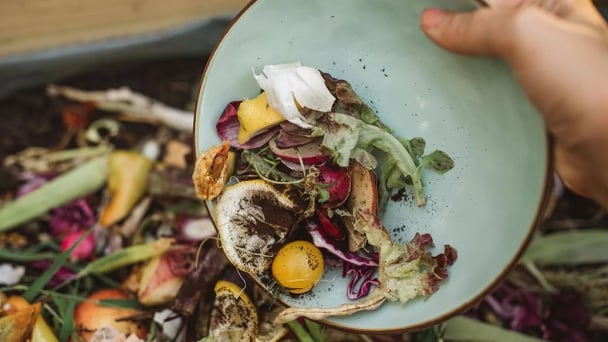May 17, 2025 | 23:39 GMT +7
May 17, 2025 | 23:39 GMT +7
Hotline: 0913.378.918
May 17, 2025 | 23:39 GMT +7
Hotline: 0913.378.918

Phu Tho is focusing on developing banana trees in association with promoting exports. Photo: Tran Ho.
Recently, the quality of Phu Tho bananas has been somewhat improved along with branding. According to information from the Crop Production and Plant Protection Sub-Department of Phu Tho province, in 2023, the unit has issued 24 production unit codes to serve domestic consumption for over 300 ha of bananas, as well as coordinating with the Department of Plant Protection to issue 9 production unit codes for 250 ha of bananas for export.
Phu Tho is planning to build concentrated banana production areas on both banks of the Red River, mainly in districts such as Lam Thao, Cam Khe, Thanh Ba, and Tam Nong..., striving to have about 4,820 ha of bananas by 2025. In the coming time, Phu Tho bananas will focus on the main export market, with many advantages in China.
To achieve this goal, Phu Tho will organize banana production in a centralized manner, linked along the value chain to meet large quantities, uniform quality, and specific planting area codes. In those link chains, the relationship between farmers and businesses and cooperatives must be tight and contractual to avoid freedom of production and sale and ensure stability in output. Not only production but also the transportation, processing, and preservation stages must also be focused on upgrading warehouses, packaging equipment, labels... to affirm the brand.
Translated by Hoang Duy

(VAN) The project contributes to enhancing the resilience of communities vulnerable to the impacts of climate change, with a primary focus on local women.

(VAN) Green materials help save energy and resources. However, after more than 10 years, Vietnam has only developed over 200 green buildings with more than 6 million square meters of floor space.

(VAN) Vietnam - Thailand Business Forum 2025: One plus one on three connects, marking a milestone in the comprehensive strategic partnership between the two nations.

(VAN) The United Nations designated 22 May as the International Day for Biodiversity 2025 with the theme 'Harmony with nature and sustainable development.'
![Multi-channel, multi-directional Vietnamese agricultural markets: [8] A national strategy is needed](https://t.ex-cdn.com/nongnghiepmoitruong.vn/608w/files/phucpm/2025/05/15/1435-thi-truong-nong-san-viet-da-kenh-da-huongbai-8-can-mot-chien-luoc-quoc-gia-084750_728.jpg)
(VAN) The Chairman of Hung Nhon Group shared: ‘Opening up and tapping into new markets is the right and strategic direction for Vietnam's agricultural sector.’

(VAN) Food waste has become a serious issue in modern society, especially in rapidly urbanizing and developing cities like Hanoi.
![Multi-channel, multi-directional Vietnamese agricultural markets: [7] Deep processing makes global reach easy](https://t.ex-cdn.com/nongnghiepmoitruong.vn/608w/files/huytd/2025/05/16/2946-che-bien-sau-chia-khoa-vang-nang-tam-nong-san-viet-tren-ban-do-the-gioi-080603_110-093858.jpg)
(VAN) The application of deep processing technology is helping Vietnamese agricultural products enhance their value, create competitive advantages, and open doors to conquer global consumers.